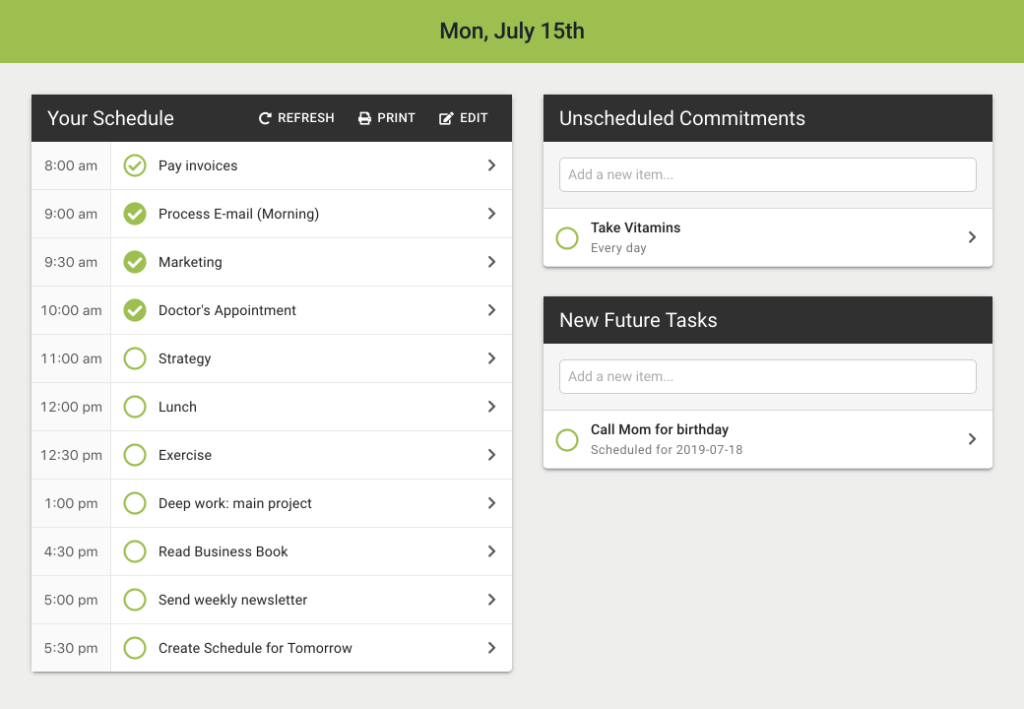As the new year begins, it’s common for people to create a list of New Year’s resolutions: goals you want to achieve, habits you want to start or break, projects you want to complete.
Most resolutions don’t work because we don’t make them actionable or we don’t shift our identity to allow those resolutions to take hold in our life.
For smaller resolutions that don’t require much time, focusing on the daily actions we can take over the outcomes we want and adopting an identity that supports those actions can be extremely helpful.
For larger resolutions, like writing a book, learning a new language, or achieving specific success at work, these are necessary, but not sufficient.
Time doesn’t just magically appear because we’ve resolved to get something done. We have to create space in our schedules to allow these resolutions to flourish. And that means saying No to things we’re currently doing.
What is an Anti-Resolution?
An anti-resolution is a resolution to NOT do something for the next year.
Specifically, to give up on a goal you’ve been pursuing or put on hold a project you’ve been working on so you can pursue something bigger or more relevant in your life right now.
Too often our approach to goals and resolutions is to keep adding new ones without pruning old ones. The process of creating an anti-resolution list is the process of healthy pruning: cutting back the time sinks in your life that are no longer as important as they once were.
We all have 24 hours each day, 168 hours each week. When we add more constraints, more resolutions, more goals into our lives, we make everything harder to achieve and add stress and hastiness that reduces our quality of life and productivity.
Letting go of old goals and projects helps us make room for new ones. And that space helps not only reduce our stress, but increase our chances of success.
How to Create an Anti-Resolution List
To create your list, start by writing down everything you’ve been working on—or thinking about working on—over the past few months. What are your open loops? The projects you haven’t finished? The goals you have yet to achieve?
Next, review that list and decide to do one of the following:
- Keep Doing
Continue spending time on the goal or intention, either to bring it to completion or because it is an integral part of your life. - Put on Hold
Pause all activity on the goal or intention until a future date or trigger. - Let Go
Release the goal or intention entirely to make room for others that are more relevant to your life right now.
After you’ve done a first pass through the list, go through the list again and specifically look at your Keep Doing items. Are there items here that are more important than the others? If you only could do 3 of these, which ones would they be?
If you still have a lot of active items, consider putting some of those on hold or letting go of those to give more time and energy to the others.
Pair a Resolution with an Anti-Resolution
Despite the difficulty in keeping resolutions, many of us make them anyway. One strategy that can help make your resolutions more successful is to pair a resolution with an anti-resolution.
For each resolution, ask yourself: What am I willing to give up this year to make this resolution happen?
Adopt an anti-resolution designed to create time for your resolution. If you want to write a book, give up social media for 3 months. If you want to launch a podcast, stop going out on Tuesday nights.
Be specific though. Pair the resolution with an anti-resolution that frees up enough time in the right places for you to be successful.
So if you want to write in your journal for 15 minutes a day, deciding not to go out on Tuesday nights may not help you, as you’ll still have to find the time for the remaining 6 days of the week. Not reading the news daily would be a better anti-resolution for a daily journaling goal.
Leverage “Life Seasons” to Counter FOMO
One of the reasons we often resist letting old resolutions and goals go is our Fear of Missing Out. We want to grab as much of life as we can to make sure that life doesn’t pass us by. So when we have goals, we decide to pursue them immediately.
A useful concept to counter this is the idea of having seasons in your life. Instead of needing to do everything at once, you can decide which goals you’ll do this season and which you’ll put off until a future season.
You get to decide how long a season is: a year, 5 years, or a decade. You can even leave it open-ended and wait until a cusp point in your life to declare the change.
The beauty of the living in our modern times is that most people will live until their 70s or beyond. Excluding our first two decades, where we’re often in school and growing into adulthood, we have 50 years or more to explore and pursue our goals. That can easily be 5, 10 or 20 seasons of our life.
Reframing your life into a series of seasons, where each season you pursue different goals, can be both empowering and increase our enjoyment later.
When we pursue too many things at once, not only do we spread our energy thinly, we blur everything together in our memories. We miss out on the distinct flavors of our life that come from focused pursuit and the nice package it creates in our minds when we decide consciously to end that pursuit.
Make Your List Today
You can make an anti-resolution list at any time. It doesn’t just have to be at the start of the year. Take the time today to sit down and identify what you want to keep doing and what you will put on hold or release.
Decide what you want to achieve in this season of your life and make room for that to happen. Defer to later seasons goals and dreams that may be better suited for the future—those you aren’t willing to give up something today to pursue.
Most of all, think of creating resolutions and anti-resolutions as an ongoing process. Whether you achieve them or not, writing them down allows space for introspection on what you truly want and how you want to pursue it.








